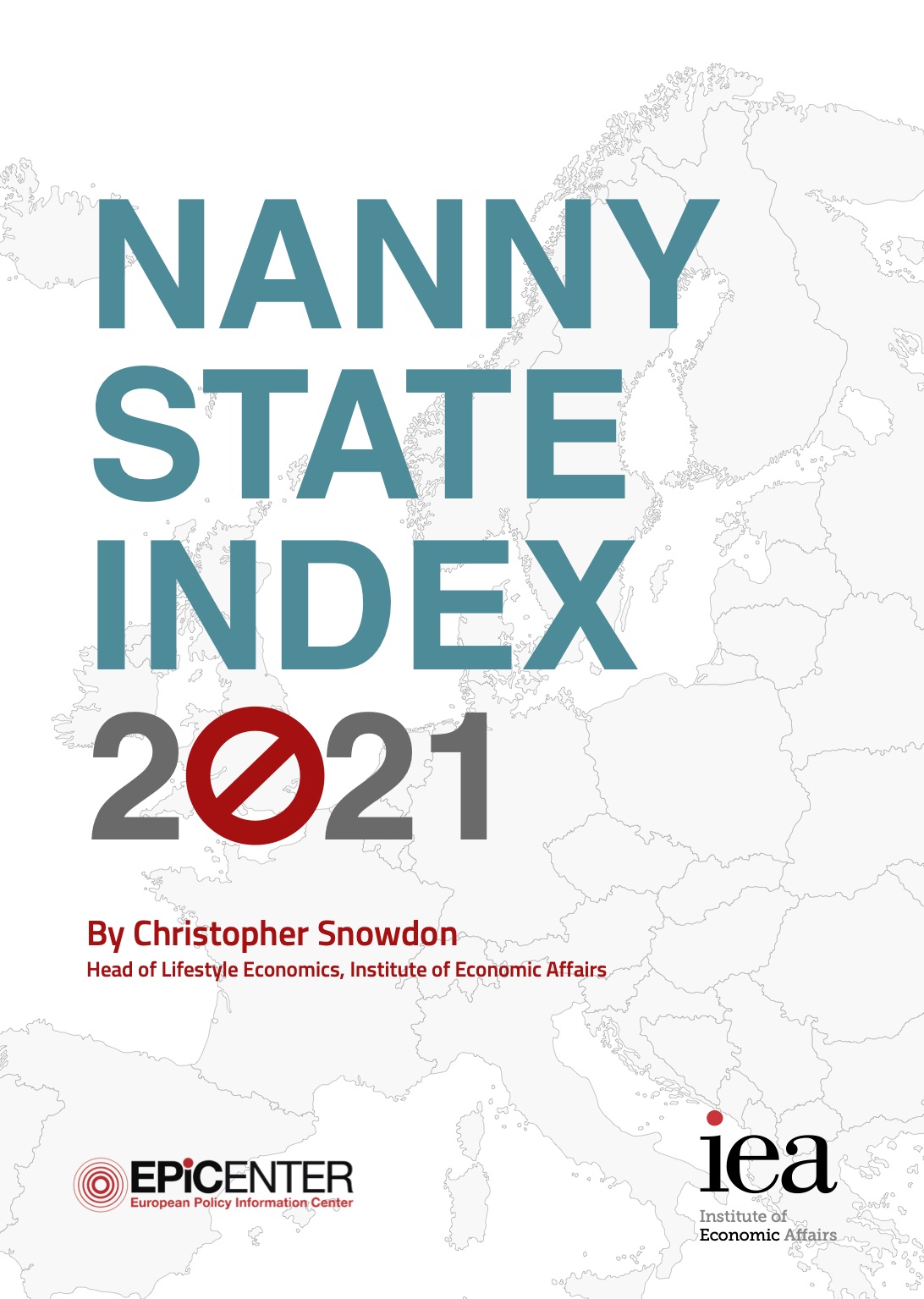Welcome to the third edition of the Nanny State Index, an EPICENTER project that ranks the EU’s 28 member states to identify the worst places to eat, drink, smoke and vape.
The Nanny State Index consists of three main categories: alcohol, nicotine and diet. Each of the three categories is weighted equally at 33.3 per cent. Nicotine is subdivided into tobacco and e-cigarettes with an equal weighting or each, ie. 16.7 per cent.

Each category has a number of different criteria. Points are scored for each criteria which are combined to reach a final score of 100. The Nanny State Index is only concerned with policies that have an adverse impact on consumers. These policies are given different weights to reflect the extent to which consumers are negatively affected, from relatively minor inconveniences to heavy taxes and outright prohibitions. Countries with higher scores are less free and countries with lower scores are more free.
Paternalistic policies typically reduce the individual’s quality of life in one or more of the following ways:
– raising prices (through taxation or retail monopolies)
– stigmatising consumers
– restricting choice
– inconveniencing consumers (eg. by restricting trading hours)
– limiting information (eg. with advertising bans)
– reducing product quality
The Index includes any policy designed to deter consumption of legal products which imposes one or more of these costs on consumers. The criteria for each category and their weightings are shown on the pages for alcohol, e-cigarettes, food and soft drinks, and tobacco. There are additional tables at the back of the Index pdf here
All data reflect the legal status in January 2019 to the best of our knowledge. We do not make adjustments for how laws are enforced. Some countries may not police their regulations effectively – in fact, we know that they do not – but this is unquantifiable. We are interested only in what the law says, not whether it is easy to flout the law in practice. Nor do we include legislation that is pending. In some instances we have included commentary about laws that have been proposed or rejected. These are included to provide additional information and do not affect the scores.
The 2019 methodology
As the nanny state evolves, the Nanny State Index must change with it. Most of the scores in the index are directly comparable from year to year, but because the ‘public health’ lobby is so successful in bringing about new restrictions on freedom it is necessary to amend some categories to reflect this. For example, neither minimum pricing for alcohol was not in existence anywhere when the last Index was compiled but it is now in force in Scotland. To account for this, we are awarding up to ten points in the alcohol category for minimum pricing and have reduced the ‘taxation’ score from 50 points to 40 points.
A new sub-category has been added under ‘Alcohol, other’ as a result of Lithuania raising the age of alcohol purchase to 20. Ten points are now awarded for an age of purchase that exceeds 18 years. ‘Alcohol, other’ now compromises five sub-categories adding up to 40 points. The score out of 40 is reweighed to a score out of 30 for the index. We have also reweighted indoor vaping bans to reflect the burden these unnecessary laws place on consumers. Vaping bans now score up to 40 points and sales regulations on e-cigarette devices/fluids score up to 30 points.
All other categories are unchanged since 2017 but because of these changes (and other changes between 2016 and 2017) the final totals cannot be directly compared year to year.
Britain’s negotiations with the EU are unresolved at the time of writing so it is not clear whether the league table shows the EU-28 or the EU-27 plus one. When the data were collected, the UK was unquestionably an EU member state.
About
The Nanny State Index (NSI) is a league table of the worst places in Europe to eat, drink, smoke and vape. The initiative was launched in March 2016 and was a media hit right across Europe. It is masterminded and led by IEA’s Christopher Snowdon with partners from all over Europe.
Enquiries: info@epicenternetwork.eu
Download Publication

Previous version: 2019
Categories
About the Editor
Christopher Snowdon is the head of Lifestyle Economics at the Institute of Economic Affairs. His research focuses on lifestyle freedoms, prohibition and policy-based evidence. He is a regular contributor to the Spectator, Telegraph and Spiked and often appears on TV and radio discussing social and economic issues.
Snowdon’s work encompasses a diverse range of topics including ‘sin taxes’, state funding of charities, happiness economics, ‘public health’ regulation, gambling and the black market. Recent publications include ‘Drinking, Fast and Slow’, ‘The Proof of the Pudding: Denmark’s Fat Tax Fiasco’, ‘A Safer Bet’, and ‘You Had One Job’. He is also the author of ‘Killjoys’ (2017), ‘Selfishness, Greed and Capitalism’ (2015), ‘The Art of Suppression’ (2011), ‘The Spirit Level Delusion’ (2010), ‘Velvet Glove, Iron Fist’ (2009).
Nanny State Criteria 2019
Welcome to the third edition of the Nanny State Index, an EPICENTER project that ranks the EU’s 28 member states to identify the worst places to eat, drink, smoke and vape.
The Nanny State Index consists of three main categories: alcohol, nicotine and diet. Each of the three categories is weighted equally at 33.3 per cent. Nicotine is subdivided into tobacco and e-cigarettes with an equal weighting or each, ie. 16.7 per cent.

Each category has a number of different criteria. Points are scored for each criteria which are combined to reach a final score of 100. The Nanny State Index is only concerned with policies that have an adverse impact on consumers. These policies are given different weights to reflect the extent to which consumers are negatively affected, from relatively minor inconveniences to heavy taxes and outright prohibitions. Countries with higher scores are less free and countries with lower scores are more free.
Paternalistic policies typically reduce the individual’s quality of life in one or more of the following ways:
– raising prices (through taxation or retail monopolies)
– stigmatising consumers
– restricting choice
– inconveniencing consumers (eg. by restricting trading hours)
– limiting information (eg. with advertising bans)
– reducing product quality
The Index includes any policy designed to deter consumption of legal products which imposes one or more of these costs on consumers. The criteria for each category and their weightings are shown on the pages for alcohol, e-cigarettes, food and soft drinks, and tobacco. There are additional tables at the back of the Index pdf here
All data reflect the legal status in January 2019 to the best of our knowledge. We do not make adjustments for how laws are enforced. Some countries may not police their regulations effectively – in fact, we know that they do not – but this is unquantifiable. We are interested only in what the law says, not whether it is easy to flout the law in practice. Nor do we include legislation that is pending. In some instances we have included commentary about laws that have been proposed or rejected. These are included to provide additional information and do not affect the scores.
The 2019 methodology
As the nanny state evolves, the Nanny State Index must change with it. Most of the scores in the index are directly comparable from year to year, but because the ‘public health’ lobby is so successful in bringing about new restrictions on freedom it is necessary to amend some categories to reflect this. For example, neither minimum pricing for alcohol was not in existence anywhere when the last Index was compiled but it is now in force in Scotland. To account for this, we are awarding up to ten points in the alcohol category for minimum pricing and have reduced the ‘taxation’ score from 50 points to 40 points.
A new sub-category has been added under ‘Alcohol, other’ as a result of Lithuania raising the age of alcohol purchase to 20. Ten points are now awarded for an age of purchase that exceeds 18 years. ‘Alcohol, other’ now compromises five sub-categories adding up to 40 points. The score out of 40 is reweighed to a score out of 30 for the index. We have also reweighted indoor vaping bans to reflect the burden these unnecessary laws place on consumers. Vaping bans now score up to 40 points and sales regulations on e-cigarette devices/fluids score up to 30 points.
All other categories are unchanged since 2017 but because of these changes (and other changes between 2016 and 2017) the final totals cannot be directly compared year to year.
Britain’s negotiations with the EU are unresolved at the time of writing so it is not clear whether the league table shows the EU-28 or the EU-27 plus one. When the data were collected, the UK was unquestionably an EU member state.

 Austria
Austria Belgium
Belgium Bulgaria
Bulgaria Croatia
Croatia Cyprus
Cyprus Czech Republic
Czech Republic Denmark
Denmark Estonia
Estonia Finland
Finland France
France Germany
Germany Greece
Greece Hungary
Hungary Ireland
Ireland Italy
Italy Latvia
Latvia Lithuania
Lithuania Luxembourg
Luxembourg Malta
Malta Netherlands
Netherlands Norway
Norway Poland
Poland Portugal
Portugal Romania
Romania Slovakia
Slovakia Slovenia
Slovenia Spain
Spain Sweden
Sweden Turkey
Turkey United Kingdom
United Kingdom


















